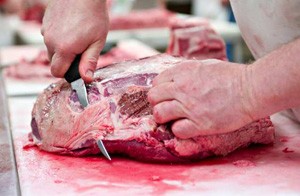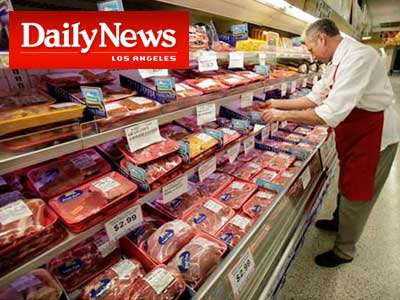Well, it’s rather a downer for the industry-led National Hamburger Month that there have been a couple of major ground beef fiascos in the past few days, including the news that meat tainted with the e. coli bacteria may be linked to illnesses in four states, as the Los Angeles Times reported.
When 1.8 million pounds of burger are recalled under that kind of pall, the sizzle of the celebration must tend to fizzle, too. But it’s not just the meat packers singing the food-borne blues; recent headlines also point out problems with edibles ranging from contaminated pet jerky (again?) to 1.2 million pound of Kraft cottage cheese to Listeria-laced hummus dips.

With warmer temps nationwide looming, and all of the Memorial Day spreads featuring potato salad, hot dogs, deviled eggs and other vectors for food-safety issues about to be consumed, you might want to brush up on some food-safety resources and story ideas.
Despite my quips, the Centers for Disease Control and Prevention reports that one in six Americans – about 48 million people — will be sickened via food each year, and that salmonella alone accounts for some $365 million annually in direct health care costs. And according to a recent press release, efforts to reduce the incidence of illness caused by tainted food produced lackluster results in 2013, with salmonella still at 2006-2008 levels and certain problems caused by chicken and dairy are actually on the rise by double digit percentages.
We all eat, and food safety is an issue that can span many business beats, from health care and medical insurance (according to the CDC, nearly 130,000 people each year are hospitalized for food-borne illnesses) to restaurant and retail businesses to technology (there are companies, like this one called Life Technologies, that specialize in testing for and mitigating food-safety risks) to legal, liability and insurance issues like the ones highlighted recently in this Food Safety News article about retailers requiring safety guarantees from growers.
Liability is a fascinating topic to localize with your region’s producers of meat, produce and dairy goods. How are their insurance needs or contractual agreements with processors and retailers changing?
Are liability concerns scaring any small producers away from farmers’ markets, food co-ops and roadside stands? What about the cottage foods industry that gained support in many states in recent years; here’s an insurance product that appears tailored just for that niche.
The Food Safety Modernization Act, signed by President Obama in 2011 but moving toward implementation at the pace of an escargot, is nevertheless a topic you should start bringing up with any industry you cover; the ramifications to specialties as diverse as trucking to consumer-goods packaging (the FSMA requires more traceability of food products so sickness can be tracked to its origin) are huge.
The act is enormous and its implementation is labyrinthine; I’ve yet to find a decent road map or primer we can consult. But you can glean a bit of the scope of the act’s reach by checking out the comments on the various rules proposed as part of the implementation; from those that would control how waste grain is transported from breweries to dairy-cow manger, to the packaging and shipping of pet foods (which will be held to far more stringent standards). You can visit Regulations.gov to check out the comments; type “food safety modernization act” or FSMA into the search engine. Check with any trade groups related to your beats, as well, about the FSMA issues that concern them the most.











